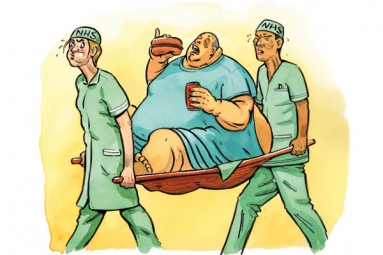
Obesity is a major health concern in the U.S. and is now considered a disease by the American Medical Association (AMA).
Tuesday, the AMA voted during its annual meeting in Chicago to classify obesity as a disease, going against recommendations from its own committees that doing so was premature.
“Recognizing obesity as a disease will help change the way the medical community tackles this complex issue that affects approximately one in three Americans,” AMA board member Dr. Patrice Harris, said in a press release Tuesday. “The AMA is committed to improving health outcomes and is working to reduce the incidence of cardiovascular disease and type 2 diabetes, which are often linked to obesity.”
Deep Brain Stimulation Resets Metabolism in Morbidly Obese Patients
While the AMA's decision has no legal bearing, it does impact how obesity is treated in America, specifically what is and is not covered under most medical insurance policies.
Now classified as a disease, the policy decision could result in broader healthcare coverage for both the treatment and prevention of obesity. However, many fear it could undermine efforts to reduce the country’s expanding waistline by causing some patients to believe they are "diseased" and unable to improve their condition.
No matter the what-ifs presented by both sides, there are still gaping holes in the medical understanding of obesity, causing a rift in nation’s largest association of physicians over what consitutes a disease.
“Without a single, clear, authoritative, and widely-accepted definition of disease, it is difficult to determine conclusively whether or not obesity is a medical disease state,” the AMA’s Council on Science and Public Health wrote in a 14-page report released Monday.
What’s in a Name?
Previously, the AMA had more than 20 policies regarding obesity, labeling it “a complex disorder,” “an epidemic,” “a major public health problem,” and more.
Those opposed to classifying it as a disease, including the AMA’s Council on Science and Public Health, say that obesity is the result of overeating and a sedentary lifestyle, two personal choices that should exclude it from a disease designation.
However, the other side argued that giving obesity a disease label would allow the issue to be addressed through legislation and prevention programs, as well as covered more extensively by private insurance plans.
“While some arguments focus on whether obesity meets or does not meet the criteria for a specific definition of disease, other arguments directly address financial incentives for research and patient care, as well as the ability to offer treatment,” the report states.
We Can’t Resist Junk Food, Even When Our Health Depends on It
Plenty of Room for Improvement
Body mass index, or BMI, is a number given to people based on their height and body weight and is the current standard by which obesity is measured.
The World Health Organization considers a person with a BMI greater than 30 as obese. Those in the AMA opposing the disease designation said in their report that in order for obesity to be considered a disease a better metric of measurement than BMI, which was developed and defined in the 19th century, is needed.
Also, detractors said there must be further research into the mechanisms underlying obesity, specifically why some people are considered obese but are otherwise healthy, while others develop comorbidities related to excess fat, such as cardiovascular disease and type 2 diabetes.
The AMA Council on Science and Public Health's report concluded that the National Institutes of Health’s National Heart, Lung, and Blood Institute should weigh in on the issue, especially in the area of cardiovascular risk.
“In the meantime, better clinical and public health strategies are warranted to assist individuals in improving their lifestyle behaviors and in reducing adverse outcomes associated with obesity,” the reported stated.
source : yahoo! health




















